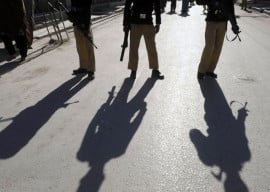
It was an unusually grey evening in Karachi of 1994. Cloudy, dull and depressing. People get very happy in our part of the world when there are signs of rain. But that evening was heavy with the blood spilled in different neighbourhoods of the city. There was a wheel jam strike called that day by a political party and those who dared defy it were shot dead.
Besides, the two factions of the party were out there to annihilate each other. The military and the civilian establishment of that time were escalating the battles on the streets while physically eliminating people through pitching one group against the other. Some friends, students and colleagues managed to gather in Arif Hasan’s study and were debating what was happening around us. The decibel level was quite high when a man entered the room and greeted all of us. He sat quietly for a while but perhaps our wayward arguments got him charged a little. He spoke with restraint but his was the most cogent, coherent and striking analysis. This man was Fatehyab Ali Khan and that was my first real communication with him. I knew off him for many years due to my own association with the progressive movement but being much junior to him, I had met him briefly only a couple of times at Arif’s place as he was married to Arif’s sister, Dr Masooma Hasan. I had a chance to meet him a few more times on different occasions after that somewhat detailed interaction.
Fatehyab as a student leader led civil and political movements and joined Pakistan Workers Party which was later merged into Mazdoor Kissan Party (MKP). He was among the 12 student leaders who were exiled from Sindh when they pioneered a movement against General Ayub’s regime in Karachi. He played a major role during the Movement for Restoration of Democracy (MRD) against Gen Ziaul Haq, and championed the rights of the workers, peasants and the wretched of the earth all his life. Once, when some of us were discussing the shortcomings of the Leftist politics in Pakistan, we all launched an attack on Fatehyab, he being the only stalwart of the movement present there. Arif Hasan provoked him by saying that to attend an all parties meeting held some years ago in Karachi, Fatehyab’s MKP couldn’t even find three delegates. Fatehyab was unflustered. He looked at me and said, “Aari is right. We are very few. On that day, it was hard to find the third delegate. But you see we had a principled position. And I think that matters.” Fatehyab wanted radical changes in the economy and polity but remained a constitutionalist always. He filed a number of historic petitions which leave a mark on the political history of the country and relentlessly pursued cases for the realisation of fundamental rights. To him, a truly democratic dispensation was the unavoidable first step in the journey towards creating a just and egalitarian society.
Khan believed that a time will come when millions of people desire to be the third member of the delegation that represents the values of equality, justice and human dignity. I share his belief.
The writer is a poet and columnist.
Published in The Express Tribune, September 27th, 2011.

















COMMENTS
Comments are moderated and generally will be posted if they are on-topic and not abusive.
For more information, please see our Comments FAQ